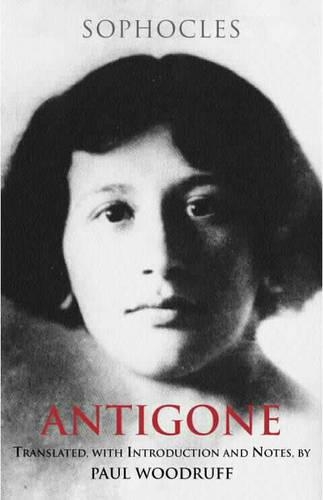
Antigone
(Paperback)
Available Formats
Paperback, New edition
Published: 1st January 1998
Paperback
Published: 15th September 2001
Paperback
Published: 25th February 2015
Paperback
Published: 14th October 1999
Paperback
Published: 2nd December 2021
Paperback
Published: 13th November 2012
Publishing Details
Antigone
By (Author) Sophocles
Translated by Paul Woodruff
Hackett Publishing Co, Inc
Hackett Publishing Co, Inc
15th September 2001
United States
Classifications
General
Non Fiction
Plays, playscripts, drama
Anthologies
882.01
Physical Properties
Paperback
102
Width 140mm, Height 216mm, Spine 8mm
114g
Description
"I would call the register 'restrained colloquial'. The language ranges between the straightforward and the genuinely poetic, its dominant characteristic being freshness. This is not the usual dull translationese, which reads as if the original were not in a language people once spoke and wrote and created art with...One of the most effective styles I have seen in a translation." -- Reader's report. Paul Woodruff is Professor of Philosophy, University of Texas at Austin.
Reviews
Woodruff's work with Peter Meineck makes this text one that is accessible to today's students and could be staged for modern audiences. Line notes printed at the bottom of the page bring a reader further quick assistance. . . . The choral odes as rendered here deserve special notice. After giving a succinct analysis of each in his introduction, Woodruff translates the lyrics into English that is both poetic and comprehensible. . . . Woodruff's rendering of the dialogue moves along easily; these are lines that any contemporary Antigone, Creon or Haemon might speak. Antigone's words on the gods' unwritten laws keep close to the Greek and yet would be authentic for a modern speaker. . . . Woodruff's introduction is a strong, clear, and clever blend of basic traditional information (to those who know Greek tragedy) and fresh insights. . . . Should our drama department ask for my advice as to a playable text, I would certainly suggest Woodruff's new version. --Karelisa Hartigan, The Classical Bulletin
A lucid, well-paced translation, natural enough sounding in the dialogue to make a good acting version, and remarkably successful in making the choruses clear, lyrical, and yet part of the dramatic movement. Woodruff's rendering of the choruses especially impresses me by the way he manages to render complex syntax and imagery of the original--often tangled and occasionally obscure in its allusiveness--into clear and genuinely poetic English. --Joseph Russo, Haverford College
When a play has been translated as many times as the Antigone, a new version has to have some remarkable qualities in order to merit attention. Happily, Woodruff's Antigone has just that. Most notably, his text is performable: when read aloud it displays real pace and force. . . . Of course, performability is often gained at the expense of what we might call 'faithfulness' to the original text--and in practical terms, this means that a performance translation rarely serves well as a teaching text. Woodruff, then, has pulled off a remarkable feat in that this edition will serve the teacher and student of Sophocles as well as it would the actor. The original line numbers are preserved and the text is seldom distorted: Woodruff is aware that the words used by Sophocles matter, and employs footnotes to good effect to explain points of linguistic and cultural interest in a concise and accessible way. The flavour of Sophocles' play is also preserved by the stage directions, which are envisaged in terms of the ancient rather than the modern stage. The choral odes--which are translated with particular clarity--are also marked and divided into strophes and antistrophes. What also sets the translation apart is the quality of the introduction and appendices, which are both well informed and address the reader in a direct way. Woodruff succeeds in being straightforward but not patronizing and whilst his target audience is presumably a student of A-level or university level, this edition would be a good starting point for any intelligent adult who wished to read the play. Woodruff frames scholarly debates in such a way as to invite reaction from the reader and to encourage informed debate. Notable, too, is that he strives to keep the text 'open': as well as presenting different scholarly views on the play, he even provides 'Endnotes' where he provides information on readings of the manuscripts, thus providing access to debates from which the student is normally excluded. As part of this project--and refreshingly in my view--he makes his own presence felt: he informs us as to his own views on the play and spells out his objectives as a translator, thus opening up yet another aspect of investigation and debate. This is a provocative edition of the Antigone , which fulfills many of its high ambitions. For me, the vibrancy of Woodruff's approach to the play shines through, giving us a text just waiting to be read aloud, discussed and debated. --James Robson, The Joint
Author Bio
Sophocles; Translated, with Introduction and Notes by Paul Woodruff
